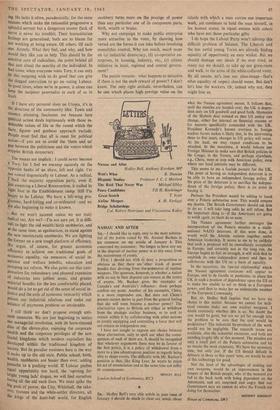Nassau and After Hedley Bull, Anthony Kershaw, MP Watt's What
R. Duncan Hispanic Studies Professor I. C. I. Met ford The Raid That Never Was Michael Sibley Peace Candidates Till H. Boehringer Great Scotch T. Scott Airline Mergers A. H. Verkuyl Bridge Scholarships Col. Robert Hem iques and Viscountess Ridley NASSAU AND AFTER
SIR,—I should like to reply only to the most substan- tial of the points raised by Mr. Alastair Buchan in his comment on my article of January 4. This concerned my statement: 'No longer to have any say in the disposal of nuclear power is to slip away from the mainstream of events.'
First, I should not wish to deny a proposition so obvious as that there are other kinds of power besides that deriving from thcr possession of nuclear weapons. The question, however, is whether a nation with no say in their disposal can remain at the centre of events. Mr. Buchan gives the examples of Canada's and Australia's influence: these perhaps confirm my point. Another of his examples, China, is a more impressive one. But does not China's present stature derive in part from the general feeling that she will soon become a nuclear power? The alternatives open to Britain are either to withdraw from the strategic nuclear business, or to seek to remain within it by collaborating with other nations in jointly equipping and controlling a force that will not remain an independent one.
I have not sought to express any choice between these alternatives, only to spell out what the conse- quences of each of them are. It should be recognised that whatever arguments there may be in favour of the first policy, it is a policy of withdrawal from a more to a less advantageous position as regards being able to shape events. The difficulty with Mr. Buchan's position is that, like King Lear, he wants to enjoy his act of renunciation and at the same time not suffer its consequences.
HEDLEY BULL
London School of Economics. WC2






























 Previous page
Previous page